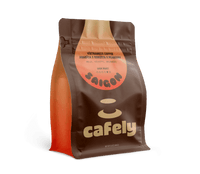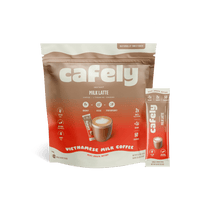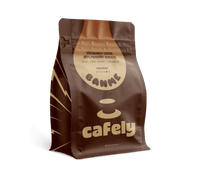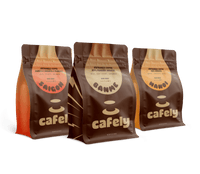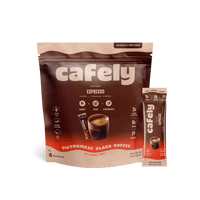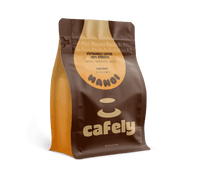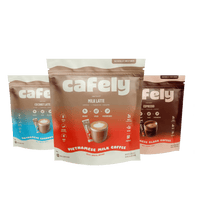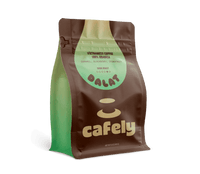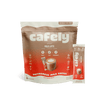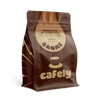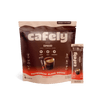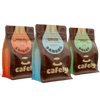Between deadlines, distractions, and the mental clutter of everyday life, staying sharp isn’t easy.
That's why people have been turning to nootropic stacks — brain-boosting supplements meant to support memory, focus, and creative flow without crashes and jitters.
A well-thought-out nootropic stack helps clear the fog so you can get through whatever’s in front of you.
We’ll take you through 20 all-natural brain-boosting combinations to help lock in when your mind wants to wander.
What Are Nootropic Stacks?

Nootropics are substances people take to help their brains work better. These supplements are associated with faster recall, longer focus, sharper thinking, and numerous other benefits.
They can be natural, like ginseng or lion’s mane, or synthetic, like racetams or modafinil.
But the goal is the same — support cognition without the side effects you get from something like Adderall or high-dose caffeine.
A nootropic stack is when you combine two or more of these substances to get a stronger or more targeted effect.
Some ingredients balance each other out. For example, one might sharpen focus while another smooths out the jitters. Others are layered to amplify a specific benefit, like verbal fluency or task endurance.
Ultimately, the idea is to get away from flooding your system with stimulants. Instead, you build a smarter, more sustainable routine for mental performance.
Benefits and Common Uses of Nootropic Stacks
People turn to nootropic stacks when they’re under pressure to push through mental fatigue without burning out or simply to think more clearly.
That includes students preparing for exams, software developers debugging until the crack of dawn, and writers chasing a spark that doesn’t follow a schedule.
For some, stacks offer better concentration during long study sessions. For others, they help hold focus during endless meetings or make it easier to enter a creative flow state.
Top 20 Legal Nootropic Stacks for Creativity, Work, & Study
Most people need a little push to get their brains working optimally. The stacks below combine ingredients that support focus, memory, and creative thinking.
They’re legal, common ingredients tailored for different kinds of mental work.
1. Caffeine + L-Theanine

This is a classic nootropic combination, giving you the benefits of caffeine without the negatives. According to one study, pairing 40 mg of caffeine with 97 mg of L-theanine helped people stay focused during mentally demanding tasks without a caffeine crash [1].
The caffeine gives you a lift, while theanine (an amino acid found in green tea) smooths it out, keeping your head clear instead of wired.
2. Lion's Mane + Rhodiola Rosea
This stack pairs brain-building power with stress-buffering support. A recent randomized trial found that lion’s mane helped improve cognitive function and lowered stress levels in healthy young adults [2].
That’s likely thanks to its ability to boost nerve growth factor — a protein tied to brain cell development and repair. Over time, that kind of neuroplastic support could help with mental clarity, memory, and creative flow.
Add Rhodiola rosea to this mix, and you have an ingredient that helps further protect your brain from burning out under pressure. Researchers found Rhodiola helps regulate stress hormones like cortisol while also improving endurance during mentally demanding tasks [3]. Together, these two may help you stay more focused and balanced during projects, protecting you from burning out.
3. Citicoline + Bacopa Monnieri
This combination supports both brainpower and stress resilience when you’re under pressure. Citicoline helps the brain build and repair cell membranes, which can improve mental speed and focus [4].
Meanwhile, Bacopa monnieri brings in a calming effect, potentially reducing anxiety while boosting memory retention.
Though the two have different mechanisms, together, they may be useful when you're juggling high-stakes problem-solving, studying for exams, or working through mentally taxing work.
4. L-Tyrosine + Rhodiola Rosea
Need your brain to work overtime? L-tyrosine supports dopamine production — the hormone that fuels focus and motivation, especially under stress [5].
Rhodiola rosea regulates cortisol and boosts endurance during mental strain [3]. Together, they may help you stay sharp when things get hectic.
5. Creatine + Acetyl-L-Carnitine (ALCAR)
Creatine and ALCAR work together to support energy production in the brain, particularly during periods of high cognitive demand [6,7].
Creatine helps maintain ATP levels — the concentration of adenosine triphosphate which gives your cells energy.
6. Alpha-GPC + Huperzine A
This pairing may help improve reaction time, working memory, and mental agility in healthy adults.
One study found that participants who took a nootropic supplement including these two ingredients reported greater creative flow and emotional balance without overstimulation [8].
This result is beneficial for deep, focused work and cognitively demanding tasks like studying.
7. Ashwagandha + L-Theanine
When stress levels drop, it’s easier to think clearly. Ashwagana — an adaptogen — helps reduce cortisol levels and alleviate stress-related symptoms, giving a sense of calm without sedation [9].
L-theanine adds improved focus and relaxation to the mix [1]. So, if you’re feeling the pressure of a looming deadline or exam, these ingredients can calm your nervous system to help support your focus.
8. Uridine Monophosphate + DHA
If you’re looking for a long-term solution to cognitive health, uridine and DHA make a strong team.
Uridine helps your brain build and maintain the membranes that surround neurons, while DHA (an omega-3 fatty acid) keeps those membranes flexible and functioning properly.
Taking both may improve how well your brain forms new connections, something that’s critical for memory and learning over time [10].
This stack may be a steady upgrade for brain structure and function.
9. Omega-3 + B-Vitamins
This combination covers all the basics to help you focus and keep your brain sharp.
Omega-3 helps keep brain cells healthy and communication running smoothly, while B vitamins support mood, energy, and memory.
Together, these supplements seem to work better, with studies finding that people with more omega-3 in their system got more cognitive benefits from B-vitamin supplements [11].
10. Rhodiola + Ginseng

For those long workdays, this combo may help keep your brain alert while calm, helping you push through mental barriers. Rhodiola helps regulate your stress response, reducing feelings of burnout and mental drag [12].
Ginseng may bring an energy boost that sharpens thinking without the overstimulation you might get from caffeine [13].
Together, they work to fight fatigue and keep your mind alert during demanding situations.
11. Cordyceps + Maca Root
Stacking this pair helps you tap into the body’s natural energy systems, keeping you motivated and mentally alert. Cordyceps may help support oxygen use and stamina, while maca root is often used for its balancing effects on hormones and mood [14,15].
When combined, they may improve motivation, drive, and focus.
12. 5-HTP + GABA
Looking for a natural approach to improving sleep quality and regulating your circadian rhythm? Supplementing this stack may promote relaxation, reduce neuronal excitability (helping quiet the brain), and release serotonin to improve mood regulation and the sleep-wake cycle.
This pairing may be particularly beneficial if you’re experiencing stress-induced sleep disturbances or looking to optimize your sleep patterns for better cognitive performance during the day [16].
13. Caffeine + L-Tyrosine + Theacrine
This trio offers a balanced approach to sustained mental energy. Caffeine produces an immediate boost in alertness and focus, while L-tyrosine supports dopamine production, aiding in motivation and cognitive flexibility.
Combining these two ingredients with Theacrine, a compound similar to caffeine, extends the stimulant effects [17]. The improved cognitive performance and mood come without the anxiety or headaches that some people get with too much caffeine.
14. Taurine + Ginkgo Biloba
Rather than spiking energy, this combo keeps the brain’s communication system flowing smoothly. Taurine helps regulate how brain cells send and receive signals and may also protect them from overexertion [18].
Ginkgo biloba is well-known for improving blood flow to the brain [19]. When combined, they may enhance mental clarity, particularly in tasks that require sustained attention over time.
15. L-Theanine + Theobromine

This is the calmer cousin of caffeine-based stacks. L-theanine helps break down mental chatter, while theobromine — a compound found in chocolate — delivers a lighter, longer-lasting stimulant effect.
This combination creates a smooth sense of alertness without the anxiety or sharp peaks that come with coffee.
16. Phosphatidylserine + Ginkgo Biloba
Built for better recall and sharper thinking, this pairing supports brain cell function from two angles. Phosphatidylserine helps maintain healthy cell membranes and supports neurotransmission — the process your brain cells use to send messages to one another to regulate memory, attention, and learning [20].
Meanwhile, Ginkgo biloba increases blood circulation and nutrient delivery. When these work together, they've been shown to support working memory [21].
17. Holy Basil + Rhodiola Rosea
Instead of revving you full of energy, this stack keeps your body steady. Holy basil supports the nervous system and helps regulate mood under pressure [22].
At the same time, Rhodiola rosea enhances your resistance to stress and physical fatigue [12].
This pairing may be ideal for long days that wear on mental endurance.
18. Choline Bitartrate + Acetyl-L-Carnitine
Focus starts with fuel, and this stack supports how that fuel is made and how efficiently your brain uses it. Choline bitartrate provides the raw material for ALCAR, a neurotransmitter key to learning and memory [23].
ALCAR supports mitochondrial energy, especially in brain cells. Together, they may improve cognitive stamina and support clearer thinking during long hours of concentration.
19. Reishi + Lion's Mane
This pairing blends physical grounding with cognitive uplift. Lion’s mane promotes neuroplasticity, helping reduce stress to improve your cognitive function. When adding reishi to the mix, you’re supporting immune balance to improve the body’s stress response [24].
This combination is particularly useful for promoting mental clarity and emotional regulation over time. Together, they provide a low-stimulation option for those focused on long-term cognitive health and reliance.
20. Magnesium L-Threonate + Vitamin D3
If you want to upgrade your generic magnesium blend, Magnesium L-Threonate is one of the few forms that can actually get into your brain. Once there, it helps strengthen the connections between brain cells. These connections — called synapses — are what allow you to learn and store new information.
Pair it with Vitamin D3, which plays a role in mood and cognitive balance, and you’ve got a steady, research-backed combo that supports better memory, clearer thinking, and long-term brain health [25].
Risks and Safety Concerns of Nootropic Stacks
Though these stacks may offer exciting cognitive benefits, they’re not without potential downsides. Here’s what to keep in mind before mixing supplements into your daily routine:
1. Side Effects
Even legal, well-tolerated nootropics can come with unwanted side effects. Common ones include nausea, headaches, insomnia, jitteriness, and digestive discomfort. These are especially prevalent when you’re trying a new stack or taking higher doses than needed.
2. Interactions with Medications
Many nootropic ingredients, like L-tyrosine GABA, or rhodiola, can interact with medications. Antidepressants, stimulants like ADHD medication, or blood pressure drugs may amplify or conflict with these compounds. Always talk to your doctor before combining nootropics with your prescription medications.
3. Overstimulation
Stacks involving stimulants like caffeine, Theacrine, or ginseng can push your system too far. The result can lead to irritability, energy crashes, trouble sleeping, or burnout if used too frequently or at high doses.
If you’re feeling the effects of overstimulation, try incorporating lower doses of the supplements and seeing how you feel.
4. Tolerance and Dependency
The brain adapts. Over time, some nootropics lose their effect or lead to mild dependency. Caffeine is the easiest example, as it becomes less effective with daily use or you may become irritable without drinking it. Cycling stacks or taking regular breaks can help prevent this.
5. Unregulated Quality
Since the supplement isn’t tightly regulated, purity, dosage, and ingredient sourcing can vary dramatically. Look for third-party testing and reputable manufacturers to reduce the risk of consuming contaminated materials or misleading labels.
6. Comorbidity Risks
People with existing mental health conditions — anxiety, depression, ADHD, bipolar disorder, and so on — may be more sensitive to nootropic ingredients. This is known as a comorbidity risk, where the presence of one condition affects how the body or brain responds to other treatments.
For example, stimulating stacks can worsen anxiety or trigger manic episodes in some people. Monitor your response and avoid self-diagnosis when considering nootropic stacks.
7. Chronic Use Concerns
Long-term, daily use of certain nootropics may lead to receptor desensitization or disrupt your body’s natural balance. Strategic breaks and periodic reassessment are recommended to avoid burnout or biochemical dependency.
Who Should Avoid Using Nootropic Stacks

For some people, nootropic supplements may do more harm than good. If you fall into any of the following categories, it’s best to steer clear or consult a doctor first:
- Minors (under 18) — The developing brain is highly sensitive and goes through rapid changes during adolescence. Introducing cognitive enhancers too early could interfere with natural growth patterns or brain chemistry in ways we don't fully understand.
- Pregnant or breastfeeding — Hormonal changes and nutrient demands during pregnancy and lactation are complicated. There’s limited research on the safety of nootropic compounds for mothers or infants, so the general rule is to avoid it until more is known.
- Psychiatric or neurological conditions — Conditions such as anxiety, depression, bipolar disorder, epilepsy, or ADHD can make nootropic use risky. Ingredients that stimulate or calm the brain may unexpectedly intensify symptoms or interact with existing treatments.
- Anyone taking prescription medications without doctor approval — Mixing supplements with prescription drugs can lead to unwanted or dangerous interactions. Even “natural” compounds can interfere with how medications are absorbed or metabolized.
Nootropic Legality
The nootropics mentioned in this article are legal to buy and use over the counter in many countries, including the US. They fall under the category of dietary supplements, which means they can be sold without a prescription as long as they follow basic manufacturing and labeling rules.
However, not everything marketed as nootropic is fair game. A few compounds exist in legal gray areas or are outright restricted.
Here’s a breakdown of notable exceptions:
- Modafinil — A prescription drug in the US used to treat narcolepsy and other sleep disorders. It’s not available over-the-counter and shouldn’t be purchased without a valid prescription.
- Phenibut — The FDA has banned this dietary supplement. While it’s still available online as a research chemical, it carries a high risk of dependency and withdrawal, and legality varies by region.
- Noopept — Often sold as a nootropic, Noopept isn’t approved as a dietary supplement in the US. It’s technically legal to possess, but is usually sold under the label of a “research chemical.”
- Phenylpiracetam & Aniracetam — These fall into a similar category as Noopept. They are not approved as supplements in the US but are still sold only for research purposes. Their legal status can be murky depending on how and where they're marketed.
- Huperzine A — Fully legal and available without a prescription, this medication is potent and affects neurotransmitter levels. Most experts recommend cycling it, taking a break after using it for a few weeks at a time.
Best Ways to Use Nootropic Stacks
Everyone’s body is different, but there are some habits everyone should get into when incorporating nootropic stacks for the first time.
Here are some things to consider:
1. Time of Day Matters
When you take your stack can change how it works. Stimulants like caffeine and L-theanine tend to work best earlier in the day. They line up with your natural energy cycles and are less likely to mess with sleep.
On the other hand, calming stacks like GABA + 5-HTP are better suited for winding down in the evening.
2. Pair with Foundational Habits
Nootropics are only as good as the base they’re built on. Without solid daily habits, you’re unlikely to get the most out of even the best stack.
Consider the following to get the best results:
- Sleep — Aim for 7 to 9 hours per night. No supplement can outsmart sleep deprivation.
- Diet — Give your brain whole foods rich in protein, healthy fats, and complex carbs. High-sugar or ultra-processed diets can counteract your stack’s effects.
- Exercise — Movement boosts circulation and brain plasticity, two things that amplify nootropic benefits.
- Mindfulness — Practices like meditation and breathwork lower stress and can boost your baseline focus, making stacks more effective when you do use them.
3. Don’t Mix Too Many Compounds at Once
Start small. Combining multiple new nootropics makes it hard to tell what’s working or what’s causing side effects. Begin with one or two, see how you respond, and slowly build from there if needed.
4. Be Careful of Dependence
Nootropics aren’t meant to replace good sleep, nutrition, or self-care. Relying on them too heavily can backfire. Treat them like tools, not crutches.
5. Don’t Ignore Reactions
Side effects aren’t rare. If you notice things like feelings of anxiousness, trouble sleeping, headaches, or stomach issues, take a step back. Stop the stack, reassess your dosage or timing, and consider switching up the combination.
Natural vs. Synthetic Nootropics: Safety, Effectiveness, and More
There are two main types of nootropics — natural and synthetic. One is derived from plants and nutrients, while the other is created in labs, and each offers its own set of benefits and trade-offs.
Natural nootropics include plant extracts, herbs, amino acids, and nutrients like Bacopa monnieri or lion’s mane mushrooms. These are typically considered gentler and safer for long-term use. They’re also often taken to support overall brain health and are widely available without a prescription.
Synthetic nootropics, on the other hand, are man-made compounds designed to improve cognition. Racetams, modafinil, and Noopept fall into the category. They may offer sharper, more immediate effects, but they also carry a higher risk of side effects and dependency, plus legal complications.
Natural compounds generally have a lower risk profile, especially when used within recommended doses. Synthetics can affect neurotransmitter systems more aggressively, potentially leading to tolerance or harmful interactions.
Whichever version you use, make sure you do the research to know exactly what you’re putting in your body. Always consult a medical professional, too, if you’re incorporating these supplements into your daily routine.
FAQs: Best Nootropic Stacks

Want to learn more about nootropic stacks?
Here are the most frequently asked questions about nootropic stacks:
1. What Is a Nootropic Stack?
A nootropic stack is a group of supplements taken together to target brain performance. Each ingredient plays a different role. One might boost focus while another improves memory or reduces stress. The goal is to create a balanced effect that’s greater than any single compound alone.
2. Are Nootropic Stacks Safe?
They can be, but safety depends on the ingredients used, how healthy you are, and the medications you’re currently taking. Always do your research and talk to a doctor first.
3. Can I Use Stacks Daily?
Some stacks are safe for daily use. Stronger synthetics or GABA-affecting supplements should be cycled to avoid tolerance or dependency.
4. Do I Need a Prescription?
Most natural nootropics are available over the counter. However, synthetic options like modafinil or racetams often require a prescription or exist in legal gray areas.
5. What Stack Is Best for Studying?
Caffeine + L-Theanine is a popular go-to, combining the alertness of caffeine with the calm focus of L-theanine. Citicoline + Bacopa is also a strong option for memory and long study sessions.
6. Are Nootropics Legal?
In most places, yes, but it depends on the specific compound. Natural options are widely available, while many synthetics are regulated or restricted.
7. Can They Replace Sleep?
No, nootropics can’t replace sleep. Some stacks may temporarily offset fatigue, but nothing replaces quality sleep when it comes to supporting brain function.
8. Can I Stack More Than Two Nootropics?
Yes, you can, but it’s smart to start with low doses and incorporate them slowly over time. Track how your body responds as you introduce new ingredients.
9. Do They Work Immediately?
Some, like caffeine or L-tyrosine, kick in fast. Others, like herbal adaptogens, need time to build up in your system.
10. Can Nootropics Boost Creativity?
Yes, particularly stacks that support dopamine and reduce stress. Try combinations like rhodiola and L-tyrosine or lion’s mane and reishi.
References
- Giesbrecht T, Rycroft JA, Rowson MJ, De Bruin EA. The combination of L-theanine and caffeine improves cognitive performance and increases subjective alertness. Nutr Neurosci. 2010 Dec;13(6):283-90. doi: 10.1179/147683010X12611460764840. PMID: 21040626.
- Docherty S, Doughty FL, Smith EF. The Acute and Chronic Effects of Lion's Mane Mushroom Supplementation on Cognitive Function, Stress and Mood in Young Adults: A Double-Blind, Parallel Groups, Pilot Study. Nutrients. 2023 Nov 20;15(22):4842. doi: 10.3390/nu15224842. PMID: 38004235; PMCID: PMC10675414.
- Slobodin, T. (2021). Comprehensive metabolic correction in cognitive impairment: theoretical background for using citicoline and Bacopa monnieri combination. INTERNATIONAL NEUROLOGICAL JOURNAL, 16(7), 48–54.
- Slobodin, T. (2021). Comprehensive metabolic correction in cognitive impairment: theoretical background for using citicoline and Bacopa monnieri combination. INTERNATIONAL NEUROLOGICAL JOURNAL, 16(7), 48–54.
- Kühn S, Düzel S, Colzato L, Norman K, Gallinat J, Brandmaier AM, Lindenberger U, Widaman KF. Food for thought: association between dietary tyrosine and cognitive performance in younger and older adults. Psychol Res. 2019 Sep;83(6):1097-1106. doi: 10.1007/s00426-017-0957-4. Epub 2017 Dec 18. PMID: 29255945; PMCID: PMC6647184.
- Smeland OB, Meisingset TW, Borges K, Sonnewald U. Chronic acetyl-L-carnitine alters brain energy metabolism and increases noradrenaline and serotonin content in healthy mice. Neurochem Int. 2012 Jul;61(1):100-7. doi: 10.1016/j.neuint.2012.04.008. Epub 2012 Apr 23. PMID: 22549035.
- Avgerinos KI, Spyrou N, Bougioukas KI, Kapogiannis D. Effects of creatine supplementation on cognitive function of healthy individuals: A systematic review of randomized controlled trials. Exp Gerontol. 2018 Jul 15;108:166-173. doi: 10.1016/j.exger.2018.04.013. Epub 2018 Apr 25. PMID: 29704637; PMCID: PMC6093191.
- Medrano M, Molina-Hidalgo C, Alcantara JMA, Ruiz JR, Jurado-Fasoli L. Acute Effect of a Dietary Multi-Ingredient Nootropic as a Cognitive Enhancer in Young Healthy Adults: A Randomized, Triple-Blinded, Placebo-Controlled, Crossover Trial. Front Nutr. 2022 May 12;9:858910. doi: 10.3389/fnut.2022.858910. PMID: 35634417; PMCID: PMC9133906.
- Mikulska P, Malinowska M, Ignacyk M, Szustowski P, Nowak J, Pesta K, Szeląg M, Szklanny D, Judasz E, Kaczmarek G, Ejiohuo OP, Paczkowska-Walendowska M, Gościniak A, Cielecka-Piontek J. Ashwagandha (Withania somnifera)-Current Research on the Health-Promoting Activities: A Narrative Review. Pharmaceutics. 2023 Mar 24;15(4):1057. doi: 10.3390/pharmaceutics15041057. PMID: 37111543; PMCID: PMC10147008.
- Holguin S, Martinez J, Chow C, Wurtman R. Dietary uridine enhances the improvement in learning and memory produced by administering DHA to gerbils. FASEB J. 2008 Nov;22(11):3938-46. doi: 10.1096/fj.08-112425. Epub 2008 Jul 7. PMID: 18606862; PMCID: PMC2574024.
- Oulhaj A, Jernerén F, Refsum H, Smith AD, de Jager CA. Omega-3 Fatty Acid Status Enhances the Prevention of Cognitive Decline by B Vitamins in Mild Cognitive Impairment. J Alzheimers Dis. 2016;50(2):547-57. doi: 10.3233/JAD-150777. PMID: 26757190; PMCID: PMC4927899.
- Tinsley GM, Jagim AR, Potter GDM, Garner D, Galpin AJ. Rhodiola rosea as an adaptogen to enhance exercise performance: a review of the literature. Br J Nutr. 2024 Feb 14;131(3):461-473. doi: 10.1017/S0007114523001988. Epub 2023 Aug 29. PMID: 37641937; PMCID: PMC10784128.
- Geng J, Dong J, Ni H, Lee MS, Wu T, Jiang K, Wang G, Zhou AL, Malouf R. Ginseng for cognition. Cochrane Database Syst Rev. 2010 Dec 8;(12):CD007769. doi: 10.1002/14651858.CD007769.pub2. PMID: 21154383.
- Meissner HO, Mrozikiewicz P, Bobkiewicz-Kozlowska T, Mscisz A, Kedzia B, Lowicka A, Reich-Bilinska H, Kapczynski W, Barchia I. Hormone-Balancing Effect of Pre-Gelatinized Organic Maca (Lepidium peruvianum Chacon): (I) Biochemical and Pharmacodynamic Study on Maca using Clinical Laboratory Model on Ovariectomized Rats. Int J Biomed Sci. 2006 Sep;2(3):260-72. PMID: 23674989; PMCID: PMC3614604.
- Song J, Wang Y, Teng M, Cai G, Xu H, Guo H, Liu Y, Wang D, Teng L. Studies on the Antifatigue Activities of Cordyceps militaris Fruit Body Extract in Mouse Model. Evid Based Complement Alternat Med. 2015;2015:174616. doi: 10.1155/2015/174616. Epub 2015 Aug 17. PMID: 26351509; PMCID: PMC4553310.
- Hong KB, Park Y, Suh HJ. Sleep-promoting effects of a GABA/5-HTP mixture: Behavioral changes and neuromodulation in an invertebrate model. Life Sci. 2016 Apr 1;150:42-9. Doi: 10.1016/j.lfs.2016.02.086. Epub 2016 Feb 26. PMID: 26921634.
- Kuhman DJ, Joyner KJ, Bloomer RJ. Cognitive Performance and Mood Following Ingestion of a Theacrine-Containing Dietary Supplement, Caffeine, or Placebo by Young Men and Women. Nutrients. 2015 Nov 19;7(11):9618-32. doi: 10.3390/nu7115484. PMID: 26610558; PMCID: PMC4663612.
- Hernández-Benítez R, Ramos-Mandujano G, Pasantes-Morales H. Taurine stimulates proliferation and promotes neurogenesis of mouse adult cultured neural stem/progenitor cells. Stem Cell Res. 2012 Jul;9(1):24-34. doi: 10.1016/j.scr.2012.02.004. Epub 2012 Mar 7. PMID: 22484511.
- Mashayekh A, Pham DL, Yousem DM, Dizon M, Barker PB, Lin DD. Effects of Ginkgo biloba on cerebral blood flow assessed by quantitative MR perfusion imaging: a pilot study. Neuroradiology. 2011 Mar;53(3):185-91. doi: 10.1007/s00234-010-0790-6. PMID: 21061003; PMCID: PMC3163160.
- Kim HY, Huang BX, Spector AA. Phosphatidylserine in the brain: metabolism and function. Prog Lipid Res. 2014 Oct;56:1-18. doi: 10.1016/j.plipres.2014.06.002. Epub 2014 Jun 30. PMID: 24992464; PMCID: PMC4258547.
- Kennedy DO, Haskell CF, Mauri PL, Scholey AB. Acute cognitive effects of standardised Ginkgo biloba extract complexed with phosphatidylserine. Hum Psychopharmacol. 2007 Jun;22(4):199-210. doi: 10.1002/hup.837. PMID: 17457961.
- Lopresti AL, Smith SJ, Metse AP, Drummond PD. A randomized, double-blind, placebo-controlled trial investigating the effects of an Ocimum tenuiflorum (Holy Basil) extract (HolixerTM) on stress, mood, and sleep in adults experiencing stress. Front Nutr. 2022 Sep 2;9:965130. doi: 10.3389/fnut.2022.965130. PMID: 36185698; PMCID: PMC9524226.
- Ferreira GC, McKenna MC. L-Carnitine and Acetyl-L-carnitine Roles and Neuroprotection in Developing Brain. Neurochem Res. 2017 Jun;42(6):1661-1675. doi: 10.1007/s11064-017-2288-7. Epub 2017 May 16. PMID: 28508995; PMCID: PMC5621476.
- Wachtel-Galor S, Yuen J, Buswell JA, et al. Ganoderma lucidum (Lingzhi or Reishi): A Medicinal Mushroom. In: Benzie IFF, Wachtel-Galor S, editors. Herbal Medicine: Biomolecular and Clinical Aspects. 2nd edition. Boca Raton (FL): CRC Press/Taylor & Francis; 2011. Chapter 9.
- Zhang C, Hu Q, Li S, Dai F, Qian W, Hewlings S, Yan T, Wang Y. A Magtein®, Magnesium L-Threonate, -Based Formula Improves Brain Cognitive Functions in Healthy Chinese Adults. Nutrients. 2022 Dec 8;14(24):5235. doi: 10.3390/nu14245235. PMID: 36558392; PMCID: PMC9786204.
